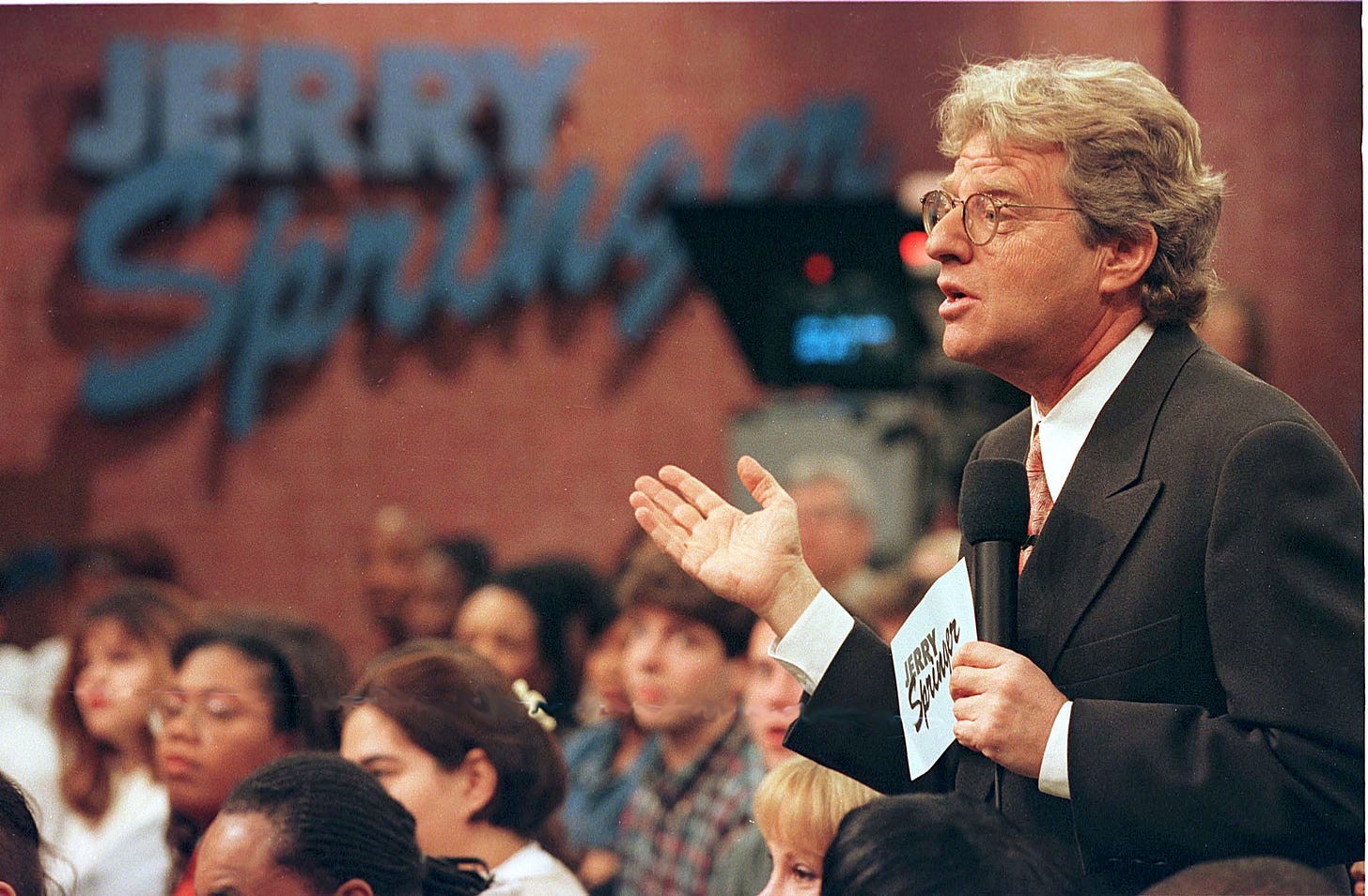The Netflix Jerry Springer documentary should've been more Jewish?
I was pretty disappointed with the moralizing “Jerry Springer: Fights, Camera, Action.”
Friends, I want to be real with you: I included the Jerry Springer Netflix documentary “Jerry Springer: Fights, Camera, Action” in my Jewish TV round-up for this month, and I said I couldn’t wait to watch. I think the cheesy title should’ve been the foreshadowing I needed, but I love a good pun and didn’t think much of it.
Alas, now that I have actually watched it, I need to offer a major correction. The show has very little to say about Jerry Springer himself, son of Jewish refugees and gifted politician who believed in the promise of America only to “destroy” its culture (his glib words, not mine) with “The Jerry Springer Show,” the most violent and salacious talk show to have possibly ever aired. But it also had very little nuance to offer about why so many viewers tuned into the show or about its lasting cultural impact. IT RUINED THE CULTURE, filmmaker Luke Sewell seems to shout with this two-part docu-series, and also maybe caused a terribly tragic murder, though he doesn’t successfully make a case for that accusation. What he does make the case for is that the show’s producers did not do their due diligence to care for the mental health of its often more vulnerable guests — a general sin of most talk TV and reality TV that don’t make Springer’s or his producers’ unscrupulous methods that unique.
I never really watched “Jerry Springer.” I was more of a Ricki Lake girl myself (Springer said that the infamous “Jerry! Jerry!” chant was inspired by Lake’s “Go Ricky! Go Ricky!” and that the “Hairspray” actress’s talk show was big inspiration for his own). Whenever I did catch it on TV, it was Jerry, with his Jewish fatherly presence, that caught my attention, not the guests.
Yet listening to the “This American Life” episode in which Alex Blumberg delves into Jerry’s story, I became a Jerry fan — or rather more, a fan of the kind of human conflict he embodied, as someone who wanted to do good in a flawed world, who ended up hosting a show that became larger than what he could’ve ever anticipated, who cared for the subjects of said show but also didn’t seem to be aware of the toxic environment all around him, who didn’t seem to understand that it was actually kind of a big deal and that there came some responsibility and great cultural impact with being a #1 rated talk show.
In the Netflix series, culture critic Roger Feder posits that Springer sold his soul to the devil when he allowed producer Richard Dominick to make “The Jerry Springer Show” what it was, a show full of violence, salaciousness and shocking stories that that led to the ruination of American culture (again, a point I don’t agree with as I write this piece for the internet where I think there is so much more darkness than there ever has been on prime time or late night TV). On Kveller, I wrote about how I found the documentary moralizing in a way that felt disingenuous — packaging together the most shocking bits of the show because it knows that’s what viewers really want and also chastising the show for knowing the very same thing.
I think what’s really interesting about “The Jerry Springer Show” is how it appealed to the primal human instinct for entertainment — producers and Jerry called it “the circus,” a remaking of the Roman Colosseum, a continuation of what has always thrilled us humans all throughout history — fights and freak shows.
Ultimately, I wish “Fights, Camera, Action” was more Jewish in spirit — meaning, more full of questions and nuanced opinions about why “The Jerry Springer Show” still looms so big in our cultural zeitgeist.
I wish it had asked more questions like: What do the actual viewers of the show think about its cultural impact now? Were the guests all really taken advantage of — or was there a way the show made them feel seen? Was it all just this type circus that we love so much? Why, so many years after its heyday, are we still so captivated by “The Jerry Springer Show?” Did Jerry Springer ruin the culture, or is it our culture to consume the type of content that he provided?
Did you watch “The Jerry Springer Show?” Do you have any answers to these questions? Did you watch the Netflix doc and dislike it as much as I did? Let me know in the comments.






Reality TV of today fills that same voyeuristic need, minus the violence. Our social norms have changed (deteriorated, that's a matter of personal opinion) so that most of the topics that were considered shocking when Jerry Springer aired, are now accepted as quasi-normal. Except for marrying a horse...
Never liked the Jerry Springer or Ricki Lake shows (sorry). Definitely not my kind of entertainment.